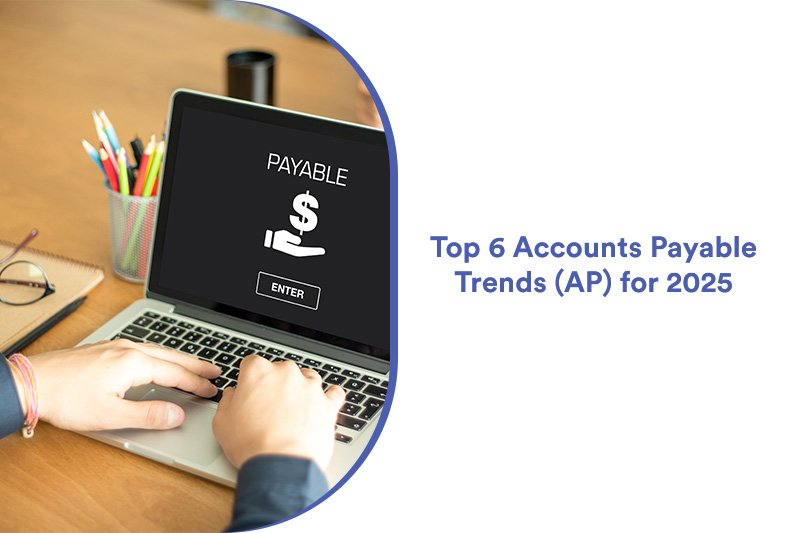The money that a company owes its suppliers for products and services that were bought on credit is known as accounts payable (AP). The sum of the approved and unpaid supplier bills is shown as a current obligation on the balance sheet. To prevent defaults, businesses must make timely payments on these outstanding bills. That is a proper account payables management is necessary.
The coming year will witness a transformative shift in the AP management process, driven by revolutionary trends.
Below are the top 6 accounts payable trends (AP) for 2025:
Switching Away from Manual Processes
Switching away from manual processes can definitely be considered a trend. In fact, it’s a major trend driving the transformation of AP management process across various industries. Automation eliminates repetitive tasks, reduces human error, and speeds up processes, leading to significant time and cost savings. Automated systems are less prone to errors compared to manual processes, ensuring data accuracy and reliability.
Growing Use of Machine Learning and AI
The use of machine learning (ML) and artificial intelligence (AI) in financial technology is expanding quickly.
Complex accounting functions can now be handled by more advanced AI and ML technology. These tools can match invoices to purchase orders, automate the process of extracting data from invoices, and even forecast future cash flow by analysing previous data in accounts payable. Sophisticated AI systems are able to adjust to changing conditions, learn from past data, and constantly increase accuracy and efficiency.
As these technologies develop, they will be able to do accounting chores, analyse financial data, and make decisions on their own.
Rising Importance of Real-time Data
In every department of the company, including accounts payable, there is a growing need for real-time data. Businesses can assess their financial performance in real time, spot patterns, and adjust their financial performance accordingly with real-time data analysis.
Growing Importance of Automated Regulatory Compliance is Necessary
The complexity and demands of regulations are only increasing. Nowadays, businesses must adhere to ever-changing legal regulations, which can seem daunting and challenging to manage without the aid of cutting-edge technology.
Through the interpretation and application of accounting regulations, internal audits, and the production of correct financial reporting, automation technology can help ensure regulatory compliance. Autonomous accounting systems can lower the chance of mistakes and non-compliance by incorporating regulatory requirements into their algorithms.
By keeping current data, enforcing policy regulations, and offering built-in audit trails, AP automation can assist businesses in ensuring compliance.
Growing Cloud Computing and SaaS Solution Development
Software-as-a-Service (SaaS) and cloud-based accounting platforms offer collaboration, scalability, and accessibility. Real-time data processing and smooth system integration are made possible by these technologies. Cloud computing infrastructure can be used by autonomous accounting systems to analyse massive amounts of data, carry out intricate computations, and provide real-time insights. AP teams can access and work together on documents and procedures from any location thanks to remote work solutions.
Systems for AP and ERP are Combining
Many companies use enterprise resource planning (ERP) systems to manage their operations, including accounting. Data may need to be input twice if the company’s ERP and AP systems are not completely connected. As a recommended practice for AP automation, many businesses are linking their accounting and ERP software to get rid of these inefficiencies. Additionally, a lot of people are discovering that integration might enhance other payment procedures.
These are trends that will help organisations in streamlining their AP processes, reducing costs, improving accuracy, and enhancing overall financial performance.
Businesses that need to streamline their AP process should think about accounts payable outsourcing. Hiring a third-party vendor to handle and carry out certain accounts payable (AP) duties, such as processing and paying invoices, is known as accounts payable (AP) outsourcing.
Businesses can find Mynd Integrated Solutions Pvt. Ltd. to be a trustworthy outsourcing partner. Prominent global business process and technology management company Mynd offers tech-enabled F&A solutions to a wide spectrum of organisations, including small and medium-sized businesses and Fortune 500 companies.
Mynd is equipped with a wide range of account payable services that help clients manage their end-to-end accounts payable function. Leveraging two decades of experience in simplifying complex business problems, it engineered tech-enabled solutions that improve the accounts payable department. It not only delivers core services efficiently but also drives continuous process improvement by optimising performance and costs. Its solution empowers managers to oversee the entire AP process, proactively identify bottlenecks, and prevent process disruptions.
Additionally, it has created Mynd PEARL, an automation solution for trade payables. It improves the partner ecosystem and produces measurable savings by streamlining an organisation’s “Procure to Pay” business cycle. PEARL includes BOTS, which offer ERP-agnostic solutions when native ERP is not to be exposed, and intelligent AI-enabled OCR, which increases the process’s overall operational efficiency.
Conclusion
These trends will assist businesses in improving accuracy, cutting expenses, simplifying their accounting procedures, and improving overall financial performance.
Mynd Integrated Solutions Pvt. Ltd. is a company that provides the best account payable solution. Utilising two decades of experience in simplifying complex business problems and automation, it has developed tech-enabled solutions to enhance accounts payable operations.

